We've both been needing new hiking boots for a while now. I've actually lost count of how many times we have repaired our current pairs of boots with copious amounts of super glue. It's only a matter of time before there is more glue than boot, which means it's time for us to start looking into getting new boots!
We purchased our first ever pairs of hiking boots almost 7 years ago and we've hit our fair share of trails in that time. 7 years ago, we weren't really too bothered with how or what our boots were made of. We wanted them to last, to fit well and, let's be honest, be relatively inexpensive. We shopped the sales and didn't ask too many questions about who made the boots or if they were good for the environment.
Honestly, back then, we never considered how much of an impact hiking shoes, or clothes, can have on our planet. We have since had our eyes opened to the atrocities of fast fashion, the impact of certain materials on the planet, the waste produced by the fashion industry and the appalling conditions people work under to make these items. Now that we know the impact our purchases can have on people and the Planet we wanted to choose our next pair of boots consciously, with both those things at the forefront of our purchasing decisions.
Be sure to check out our Instagram to see our new eco-conscious hiking boots in action!
How To Find Ethical Boots
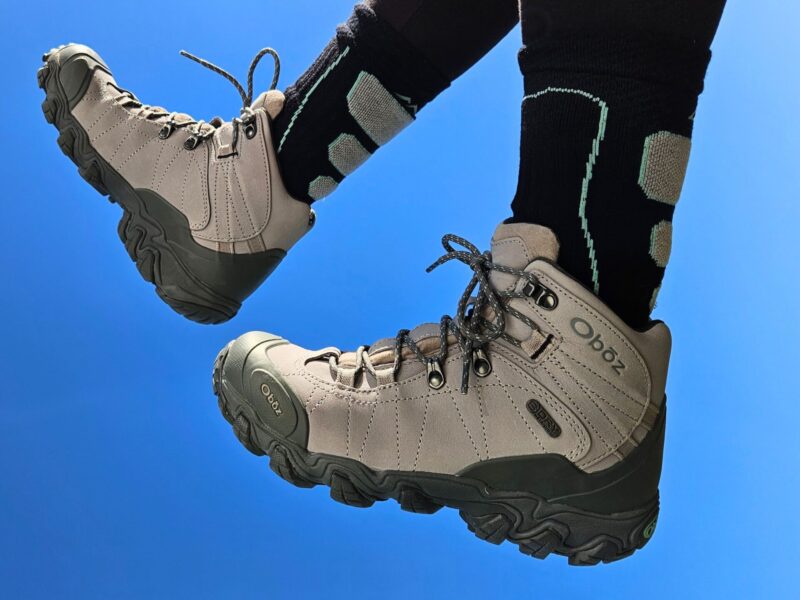
Unfortunately, there isn't a super easy way to do this as the perfect eco-conscious boot doesn't exist. Given the multiple components to a hiking shoe and the various materials that go into making them, it is very hard to ensure these live up to an eco-conscious standard. The long supply chains that go along with the multiple materials in your boot make it even harder from a customer perspective to trace how ethical and sustainable the entire shoe is. We are left up to trusting what the company tells us and leaning on ethical ratings to gauge what we should spend our money on.
In our research (Tiff spent hours reading company statements and initiatives from what the shoe was made of, to how they were reducing production impacts) we found there is no easy way to say what brands are truly ethical and what brands aren't. Actually, that's not 100% true, some brands are very much not ethical, but we didn't look too much into those. The brands that have some good policies and procedures in place are hard to rank against each other.
None of the brands below are perfect. We don't think the perfect, tick all the boxes, shoe exists. That is why we have compiled these brands here to talk about what they are doing well and let you make your own decision on what boots to get from there. We found that resources like Shop Ethical, Good on You, the Fashion Transparency Index and the Ethical Fashion Guide to be incredibly helpful in ranking companies. We use them in other fashion purchases too!
What Questions We Wanted Answered Before Buying
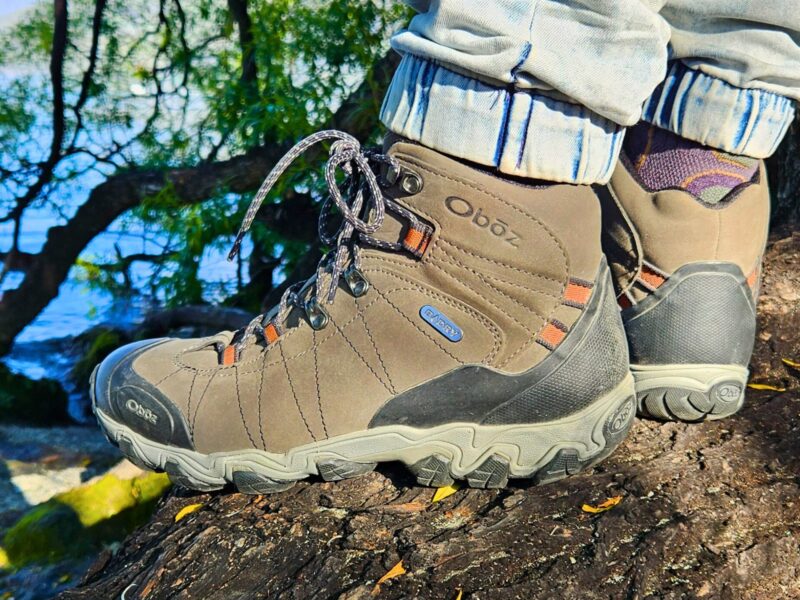
- We wanted to make sure brands were paying their employees appropriately at all levels of their supply chains.
- We wanted shoes that were good for the environment and wouldn't leave a lasting impact on the trails we were hiking, either. This meant no PFCs used in the production of the boots which rules out Gore-Tex.
- Ideally, these companies would have plans in place to better their operations moving forward and be transparent in how they are achieving these claims.
- We also loved to see that a lot of them had community minded endeavours such as planting trees or charity projects embedded in their companies.
The Brands We Looked Into
Living in Aotearoa, we are limited in what footwear we can purchase. Not all the ethical hiking shoe companies that came up on Ecosia (eco friendly google alternative) would ship to us. A lot of what we first found were companies based in Europe and a couple in the US that didn't ship to New Zealand or didn't have great return policies if the shoes didn't fit. Hiking boots are expensive and we really felt we had to try them on before purchasing.
We also didn't like the carbon footprint that comes with buying shoes from overseas and getting them individually shipped to us here in Aotearoa. So these companies are great options for those of us in either Australia or New Zealand. If you live in Europe or the US, we recommend doing a bit of your own research to see if you have a better option closer to home.
Keen

Good On You Rating: 2/5 for planet and people.
Shop Ethical Rating: D
Fashion Transparency Index: N/A
Ethical Fashion Guide: N/A
PFC: NO! 100% PFC and toxin free.
Certifications: Leather working group.
Made In: USA, Dominican Republic and Thailand.
Parent Company: N/A. This is a family-owned company.
Community: Keen Effect, funding grants and supporting grassroots initiatives. Follow this link for more detail on their website: What's The Keen Effect?
A very transparent family owned company. We love that they are toxin and PFC free. There seem to be goals in place to improve their sustainability, which is wonderful to see!
Unfortunately, the company wasn't included in the Ethical fashion guide or the Fashion Transparency Index, so it is a little hard to rank them against the other shoes we looked into. But their website is incredibly transparent and easy to find all the answers to our questions. Overall, we'd be more than happy to purchase a pair of their shoes.
Merrell

Good On You Rating: 2/5 for planet 1/5 for people.
Shop Ethical Rating: F
Fashion Transparency Index: 8/100
Ethical Fashion Guide: 14/100
PFC: Yes, uses Gore-Tex.
Certifications: Leather working group.
Made In: Vietnam and China.
Parent company: Wolverine World Wide .
Community: N/A
Remember how we said it's hard to tell if a brand is ethical? Well, it's easy to tell when they aren't doing as much as they could. We didn't need to do much more research into Merrell after seeing these above ratings. However, Tiff did have a quick look on their website out of curiosity.
If you would like an example of green washing, they do it pretty well.
There are a lot of catchy words and pretty pictures that make it seem like Merrell is putting in a lot of effort to be environmentally friendly. However, they don't back it up with any evidence that Tiff could find. They show no indication of how their 2025 goals are progressing and their schemes for returning shoes at end of life are so far just a nice logo on their page. The fact that one of their 2025 goals is to reduce and not eliminate plastic packaging is not good enough. So, this is one shoe brand we won't be considering.
Lowa

Good on You Rating: N/A
Shop Ethical Rating: N/A
Fashion Transparency Index: N/A
Ethical Fashion guide: N/A
PFC: Yes, uses Gore-Tex
Certifications: SEREX Leather, DIN ISO
Made in: Europe (Germany, Italy and Slovakia)
Parent company: Tecnica Group Italy
Community: Donates 1000 shoes annually. Supports a reforestation project through Bavarian State Forest Enterprise, which includes planting 500 trees annually.
LOWA is a smaller brand company operating in Europe, so they did not appear on any of the above resources. This just means they haven't been looked at by the above ratings and does not mean they are an ethically bad company. In fact, their website is very transparent and seems to point to them being very good in the scheme of things.
Their core philosophy is that the longer your shoes last, the more sustainable they are. They are the only company we found that offered the ability to re-sole some of their shoes, allowing you to extend the life of the boot that much further! We absolutely love this idea. The fact that the shoes are entirely made in Europe with all the productions stages overseen by LOWA means that working conditions and wages meet European standards.
The company is run entirely on green energy as well, with 25% of their annual energy needs coming from their own solar and the rest from hydroelectric power. They are also part of the European Outdoor Conservation Association. On top of that, they are part of the Department of Conservations (in New Zealand) uniform. D.O.C has some high standards and if they use these shoes, they must be good!
The only real downside we found for these are the Gore-Tex linings and the cost of the hiking boots. Depending on your stance on leather, this could be a drawback too. We aren't vegan and believe that if you eat an animal, all of it should be used. Given the leather used is held to higher standards than necessary for certification, you at least know you are getting the most responsibly sourced and tanned leather possible for a boot. We concluded that whilst we love a lot about these boots; they are just too pricey for us at the moment.
Teva

Good On You Rating: 3/5 for planet and people.
Shop Ethical Rating: C (parent company)
Fashion Transparency Index: 57/100 (parent company)
Ethical Fashion guide: N/A
PFC: Yes, uses Gore-Tex
Certifications: Leather working group. Part of the United Nations Global Compact (UNGC). The UNGC is the world's largest corporate sustainability initiative.
Made in: China, Vietnam and Cambodia.
Parent company: Deckers Brands.
Community: Donations to various organisations, including the Trevor Project, Conservation Alliance, and Human Rights Foundation, to name a few.
Whilst we love the look of these hiking shoes, we were a little unsure of the fact that they use Gore-Tex. This is really the only downside we saw in the shoes and the company themselves, though. Honestly, that's pretty good! We especially liked that they achieve 3/5 on Good On You for all categories.
Unfortunately, on our rounds looking to try on shoes, we could not find anyone who stocked the hiking shoes from Teva. The sandals, however, were in quite a few shops and have now made their way onto our wish list for the next time we can afford to buy good shoes!
They look great and have a lot of good things going for them, too. Their straps are made of recycled polyester fiber and are partnered with TerraCycle so that old shoes can be repurposed instead of going into landfill! So watch this space. Once we get a pair, we'll pop a little review of them down the bottom as well.
Oboz
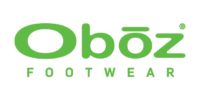
Good on You Rating: 3/5 for planet 2/5 for people.
Shop Ethical Rating: A
Fashion Transparency Index: 29/100
Ethical Fashion guide: 55/100
PCF: No! PFAS and PFCs are on their restricted substance list. Doesn't use Gore-Tex.
Certification: B-Corp
Made In: Vietnam and Cambodia.
Parent company: KMD Brands.
Community: Plants and tree for every pair sold: One More Tree. Has various community partners they support through donations such as The Conservation, Black Folks Camp, and Trees for the Future, to name a few.
The above ratings are pretty good across the board, making it easy to do the research on this one. But even if these ratings weren't available, the website for Oboz does a good job of ticking all the boxes. A very transparent, easy to navigate site with all the information you could want to read. If it wasn't easy to find something, Tiff found it in the FAQ section.
You can read their workplace code of conduct and their restricted substances lists, chemical policy, inclusions policies and much more! Head to their "Our Commitment: Communities, Climate and Circularity" section of the FAQ for all the info and links you'll need. After seeing all of this, we'd be more than happy to purchase a pair of these boots!
Salomon
Good on You Rating: 3/5 for planet 2/5 for people.
Shop Ethical Rating: F (parent company)
Fashion Transparency Index: 0/100 (parent company)
Ethical Fashion guide: N/A
PFC: No! 100% PFC and PFCec Free since 2020 .
Certifications: N/A
Made in: France, Vietnam and China
Parent company: Amer Sports which is owned by Anta Sports.
Community: "Mind the players" 1% of annual revenue towards education.
We'll start this discussion by looking at the parent company for Salomon. Salomon's parent company Amer Sports was acquired by Anta Sports in 2019. So whilst Salomon itself is quite an ethical and transparent company, it loses a lot of this credibility, as Anta sports is very much not an ethical company.
How ethical can you be if some of your profits are going towards a parent company that is neither environmentally friendly nor ethical to its employees?
Honestly, we aren't too sure how we feel about this as Salomon itself seems to be a relatively good company. However, given the unease we feel around how Anta conducts itself, we decided not to go with a pair of Salomon boots. We'll leave it up to you if you think the parent companies conduct should affect the eco-conscious stance of the smaller company.
What We Ended Up Getting And Why
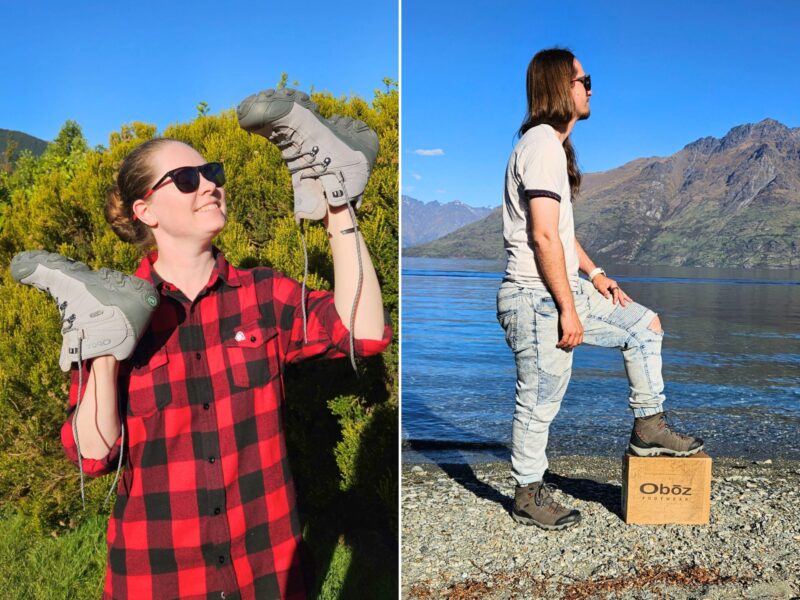
Tiff
After trying on all the shoes we could find from the list, I ended up going with a pair of Oboz Bridger Mid in Frost Gray (the only colour option at Kathmandu). They were the most comfortable of the shoes I tried on. These are my first pair of hiking shoes that go up to my ankle and I found it hard to find a pair that sat comfortably on my malleoli (or as Nathan calls them sticky outy bits…)
My feet feel well cushioned in them too! I like the fact that they are B-corp certified and I could buy them from Kathmandu, which is also a B-Corp certified company. So win-win on that front. I also got a pair of these socks from Kathmandu as they are soooo comfy. I even got a pair for Dad. They are that good!
Nathan
I was leaning towards the Tevas as the most environmentally friendly option or Keen as I'm a fan of supporting local business. But like we've said, Teva boots weren't available, and the Keens were uncomfortable on my sticky outy bits.
After trying on the Oboz, it was love at first wear. After the honeymoon period, the love is still as strong as ever. Hands down, the most comfortable shoes I have ever owned. We've done a few longer hikes since owning and have never gotten sore or blistered feet. I hope these boots last for the rest of my life because I can't imagine ever wearing anything else!
Keen for more inspo? Be sure to check out:
- How To Be An Eco-Conscious Hiker
- Day Hike – Hooker Valley Track
- What to Pack for an Eco-Conscious Day Hike



bookmarked!!, I like your website!
Thank you so much for the love!
I really like it when folks get together and share views.
Great blog, stick with it!
Thank you so much for the love! Great to hear your feedback!